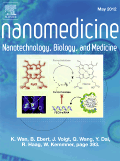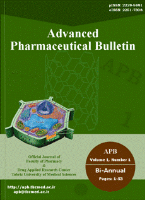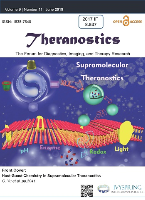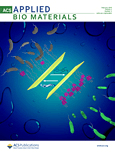
Nanomedicine-Nanotechnology Biology and Medicine
Scope & Guideline
Pioneering Research in Nanomedicine for a Healthier Tomorrow
Introduction
Aims and Scopes
- Nanoparticle Development for Drug Delivery:
Research on the design and synthesis of nanoparticles for targeted drug delivery systems, enhancing the bioavailability and therapeutic efficacy of various drugs. - Nanotechnology in Cancer Treatment:
Exploration of nanomedicines and their applications in cancer therapy, focusing on mechanisms of action, efficacy, and safety in clinical settings. - Biocompatibility and Safety Assessments:
Evaluation of the biocompatibility and safety of nanomaterials used in biomedical applications, including toxicity studies and regulatory considerations. - Innovative Diagnostic Techniques:
Development of nanoparticle-based diagnostic tools and imaging techniques aimed at early disease detection and monitoring, including the use of biosensors and imaging agents. - Theranostic Applications:
Integration of therapeutic and diagnostic capabilities in nanomedicine, allowing for simultaneous treatment and monitoring of disease progression. - Nanomaterials for Regenerative Medicine:
Use of nanotechnology in tissue engineering and regenerative medicine, focusing on scaffolds, drug delivery systems, and cellular interactions.
Trending and Emerging
- Nanoparticle-Enabled Immunotherapy:
An increasing number of studies focus on the use of nanoparticles to enhance immunotherapy, indicating a growing interest in integrating nanotechnology with immune modulation for cancer treatment. - CRISPR and Gene Editing Technologies:
Research involving nanoparticles for gene editing applications, particularly CRISPR/Cas9 delivery systems, is on the rise, showcasing the potential of nanotechnology in genetic therapies. - Microfluidics for Nanoparticle Synthesis:
The application of microfluidic technologies for the synthesis and characterization of nanoparticles is emerging as a significant trend, providing precise control over particle properties and functions. - Extracellular Vesicles as Nanocarriers:
A growing body of work is exploring the use of extracellular vesicles derived from cells as natural nanocarriers for drug delivery, highlighting advancements in biocompatible and targeted therapies. - Personalized Nanomedicine:
There is an increasing trend towards personalized approaches in nanomedicine, with research focusing on tailoring nanoparticle formulations based on individual patient profiles and disease characteristics. - Nanotechnology for Chronic Disease Management:
Emerging studies are increasingly targeting chronic diseases, such as diabetes and cardiovascular conditions, using nanotechnology for improved therapeutic outcomes and monitoring.
Declining or Waning
- Traditional Small Molecule Drug Delivery Systems:
Research focusing on conventional small molecule drug delivery methods is becoming less prevalent, as the field shifts towards more innovative, nanoparticle-based approaches. - Invasive Surgical Techniques:
The exploration of invasive techniques in conjunction with nanotechnology is waning, with a greater emphasis on non-invasive or minimally invasive approaches using nanomaterials. - Single-Modal Therapies:
There is a noticeable decline in studies dedicated solely to single-modal therapies, as the field moves towards combination therapies that integrate nanotechnology with immunotherapy or other modalities. - Basic Physicochemical Characterization:
While foundational studies are important, there is a diminishing focus on basic physicochemical characterization of nanoparticles without direct applications, as researchers prioritize functional and therapeutic outcomes.
Similar Journals

Bioengineering-Basel
Unlocking Potential in Bioengineering ResearchBioengineering-Basel, an esteemed journal published by MDPI, stands at the forefront of innovation in the field of bioengineering since its inception in 2014. With an E-ISSN of 2306-5354, this fully Open Access journal based in Switzerland provides a platform for researchers and professionals to disseminate cutting-edge findings across various aspects of bioengineering, including biomaterials, tissue engineering, and biopharmaceuticals. The journal has been recognized with a Q3 ranking in the 2023 Bioengineering category, reflecting its commitment to quality and relevance. By facilitating widespread accessibility to academic knowledge, Bioengineering-Basel aims to foster collaboration and stimulate thought leadership within the global research community, making it an indispensable resource for students, scholars, and industry practitioners alike.

Biomaterials Advances
Exploring the Future of Bioengineering with BiomaterialsBiomaterials Advances is a premier journal published by Elsevier, dedicated to the rapidly evolving field of biomaterials. Established in the United Kingdom, this open-access journal aims to disseminate high-quality, peer-reviewed research that explores innovative biomaterial designs and their applications in bioengineering and biomedical engineering. With an impressive 2023 impact factor reflected in its Q1 rankings across multiple categories—including Bioengineering, Biomaterials, and Biomedical Engineering—Biomaterials Advances stands out as a critical platform for scholars and practitioners faced with advancing technologies and methodologies in the realm of materials science. Covering a broad range of topics, from biocompatibility to tissue engineering, this journal provides an inclusive forum for researchers seeking to contribute to the field. Its Scopus rankings further affirm its position as a leading resource, with notable standings in Biomedical Engineering (Rank #13), Biomaterials (Rank #8), and Bioengineering (Rank #11), all within the top percentiles. Researchers and students alike are encouraged to contribute and engage with the latest findings and innovations in biomaterials through this valuable publication.

Advanced NanoBiomed Research
Empowering Research at the Nano-Bio InterfaceAdvanced NanoBiomed Research is a pioneering open-access journal committed to advancing the interdisciplinary field of nanobiotechnology, published by WILEY-V C H VERLAG GMBH. Since its inception in 2021, this journal has provided a platform for innovative research that bridges the gap between engineering, medicine, and materials science. With impressive rankings in Scopus, positioning it within the top quartiles of various categories, Advanced NanoBiomed Research aims to disseminate high-quality research that contributes to the understanding and application of nanomaterials in biomedical contexts. As it encompasses a wide scope—from applied microbiology to biomaterials—it serves as an essential resource for researchers, professionals, and students eager to explore the cutting-edge developments in the field. The journal promotes a collaborative environment where emerging ideas can flourish, ensuring that vital advancements in nanobiomedicine can be shared and built upon within the scientific community.

Journal of Reports in Pharmaceutical Sciences
Advancing Pharmaceutical Knowledge, One Report at a Time.Journal of Reports in Pharmaceutical Sciences is a pivotal publication in the realm of pharmaceutical research, disseminating innovative findings that cater to the evolving landscape of pharmacology, toxicology, and biomedical engineering. Published by Wolters Kluwer Medknow Publications, the journal serves as a bridge for scholars and practitioners aiming to enhance their understanding of drug development, therapeutic advances, and biopharmaceutical technologies. With an ISSN of 2322-1232 and E-ISSN 2322-5106, it has established its relevance from 2012 to 2022, occupying notable quartile rankings, including Q3 in Pharmacology, Toxicology, and Pharmaceutics. Despite being categorized in Q4 in some areas, the journal's commitment to quality research ensures it remains a respected platform for disseminating significant insights. Researchers, professionals, and students alike will find this journal an indispensable resource for staying updated on critical advancements in pharmaceutical sciences, making it a go-to source for impactful studies that shape industry practices and academic inquiries.

Frontiers in Bioengineering and Biotechnology
Pioneering Innovations for a Sustainable FutureFrontiers in Bioengineering and Biotechnology, published by FRONTIERS MEDIA SA in Switzerland, stands as a leading platform for innovative research and developments in the fields of bioengineering and biotechnology. Since its inception in 2013, this Open Access journal has garnered significant recognition, reflected in its impressive category rankings: Q1 in Biomedical Engineering and Q2 in Bioengineering, Biotechnology, and Histology for 2023. With a focus on fostering collaboration and knowledge sharing, it aims to provide researchers, professionals, and students with access to pioneering studies that push the boundaries of science and technology. The journal, which is indexed in prominent databases, boasts high visibility and impact, evidenced by its impressive rankings across various categories in Scopus. As it continues to converge from 2013 to 2024, Frontiers in Bioengineering and Biotechnology is dedicated to shaping the discourse in its field and promoting advancements that have the potential to transform healthcare and environmental sustainability.

Advanced Pharmaceutical Bulletin
Empowering Knowledge in Pharmaceutical SciencesAdvanced Pharmaceutical Bulletin, an esteemed journal published by Tabriz University of Medical Sciences & Health Services, serves as a pivotal platform for disseminating groundbreaking research in the field of pharmaceutical sciences. Since its inception in 2011, this open-access journal has dedicated itself to advancing knowledge in pharmacology, toxicology, and pharmaceutics, boasting an impressive Q1 ranking in miscellaneous categories and Q2 in pharmaceutical science as of 2023. The journal is noted for its rigorous peer-review process, ensuring that published work meets the highest standards of scientific inquiry. With notable rankings, including 7th out of 80 in general pharmacology and toxicology, it sits in the 91st percentile, highlighting its significance in the research community. Researchers and practitioners alike can access cutting-edge findings and innovative methodologies, promoting collaboration and knowledge within the scientific community. Based in Tabriz, Iran, the journal remains committed to fostering research excellence, making it an invaluable resource for scholars and professionals eager to contribute to the dynamic field of pharmaceuticals.

Biomaterials Research
Unveiling the potential of biomaterials for healthcare.Biomaterials Research, published by the American Association for the Advancement of Science, is a prominent open access journal established in 2014, dedicated to advancing the field of biomaterials. Based in the United Kingdom, this journal has swiftly become an essential platform for researchers and practitioners, offering groundbreaking insights in biomaterials, biomedical engineering, ceramics and composites, and miscellaneous medical fields. With its impressive Q1 ranking across multiple relevant categories in 2023 and its strong Scopus rankings, including a remarkable 90th percentile in the medicine category, Biomaterials Research showcases high-quality, peer-reviewed research designed to address both practical and theoretical challenges in biomaterials science. As an open access journal, it promotes wider dissemination and accessibility of research findings, crucial for fostering innovation and collaboration within the scientific community. Researchers, professionals, and students alike are encouraged to contribute, read, and engage with the latest developments in this dynamic field.

Theranostics
Empowering Research for Tomorrow's Therapies.Theranostics is a premier journal in the field of Medicine and Pharmacology, published by IVYSPRING INT PUBL. With its commitment to open access since 2011, it facilitates the widespread dissemination of innovative research, fostering collaboration and advancements in therapeutic diagnostics. The journal proudly holds a Q1 ranking in both Medicine (Miscellaneous) and Pharmacology, Toxicology and Pharmaceutics, as of 2023, showcasing its esteemed position within the scientific community. Recognized globally, it ranks in the top 1%, with Scopus rankings placing it as 4th out of 398 in Medicine and 1st out of 43 in Pharmacology. Theranostics serves as a crucial platform for researchers, professionals, and students to explore cutting-edge developments as it converges multidisciplinary approaches to enhance patient care and treatment efficacy. With a focus on bridging experimental research and clinical applications, the journal is instrumental in shaping future therapies and diagnostic strategies.

ACS Applied Bio Materials
Elevating Research Standards in Bioengineering and Material InnovationACS Applied Bio Materials is a leading academic journal published by the American Chemical Society, focusing on the innovative intersection of bioengineering and materials science. Since its inception in 2018, the journal has established itself as a pivotal platform for disseminating impactful research within the fields of Biochemistry, Biomaterials, Biomedical Engineering, and Chemistry, often ranked in the top tiers of these categories. With an impressive impact factor, it holds a Q2 ranking in both Biochemistry and Biomaterials, and a prestigious Q1 ranking in Biomedical Engineering and miscellaneous Chemistry, underscoring its significance in advancing knowledge and practices across these disciplines. The journal’s editorial commitment to high-quality, peer-reviewed research ensures relevance and rigor, appealing to a diverse audience of researchers, professionals, and students keen to explore breakthroughs in bio-related materials technology. The access options enhance its visibility and reach, allowing for a broader dissemination of studies that drive innovation and collaboration in biotechnology and material sciences. Located in the heart of Washington, DC, ACS Applied Bio Materials serves as a crucial resource for advancing the future of healthcare, engineering, and materials research.

Materials Today Bio
Fostering collaboration in the rapidly evolving world of bio-related sciences.Materials Today Bio, published by Elsevier, is an esteemed open-access journal dedicated to advancing the fields of bioengineering, biomaterials, and biomedical engineering. Since its inception in 2019, this journal has quickly made a name for itself, currently ranked Q1 in multiple categories including Bioengineering, Biomaterials, and Biotechnology, reflecting its exceptional quality and relevance in the rapidly evolving landscape of bio-related sciences. With an impressive Scopus ranking positioning it in the top 25% of its categories, Materials Today Bio provides a vital platform for researchers and professionals to share cutting-edge discoveries and innovative applications that bridge the gap between materials science and biological studies. Accessible to a global audience, this journal not only fosters collaboration among the scientific community but also aims to highlight significant advancements in cell and molecular biology, making it an indispensable resource for students and seasoned experts alike. The journal's commitment to open access since 2019 underscores its dedication to disseminating knowledge widely, ensuring that crucial findings reach those who can benefit from them the most.